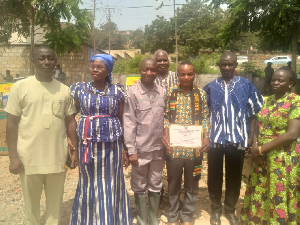The Weija Gbawe Municipal Assembly celebrated the 40th annual Farmers Day, recognizing and rewarding the vital contributions of farmers in the region.
In a ceremony filled with appreciation and optimism, the Municipal Chief Executive, Michael Dankwa, acknowledged the government’s ongoing support for local farmers, emphasizing the commitment of President Akufo-Addo’s administration to empowering agriculture across Ghana.
Dankwa highlighted that over the past four years, the assembly has distributed essential farming inputs like fertilizers, cutlasses, and seedlings to farmers to enhance their productivity.
He noted that these efforts are a testament to the government’s dedication to bolstering food security and economic development through agriculture.
“For instance, two months ago, we trained 50 young people in aquaculture, providing them with tarpaulins, 1,000 catfish fingerlings, and six bags of feed to jumpstart their farming careers,” Hon. Dankwa stated.
The event was chaired by Mr. Kwadwo Amofa-Fofie, with numerous farmers and community members attending. Among the honorees was Mr. Francis Ackom, a 38-year-old farmer from Joma, who was awarded the title of Municipal Best Farmer for his outstanding contributions to local agriculture.
In recognition of his dedication, Mr. Ackom received a tricycle (Aboboyaa) and other agricultural tools to further support his farm’s growth. Mr. Kwadwo Amofa-Fofie also supported the best farmer with ₵1000.
Hon. Dankwa also addressed ongoing challenges, such as land encroachment and stray animals affecting farms.
He shared that the assembly has been actively working with local chiefs to prevent the sale of farmland for non-agricultural purposes and is implementing measures to control stray animals.
He further urged farmers to consider farm insurance to protect their investments against potential losses.
The Farmers Day event served as a platform not only to honor dedicated farmers but also to reinforce the assembly’s commitment to agricultural progress.
The Weija Gbawe assembly’s initiatives align with the national vision for food security and economic growth, supporting farmers with resources, training, and long-term development strategies.
Regional News of Sunday, 10 November 2024
Source: www.ghanaweb.com

















